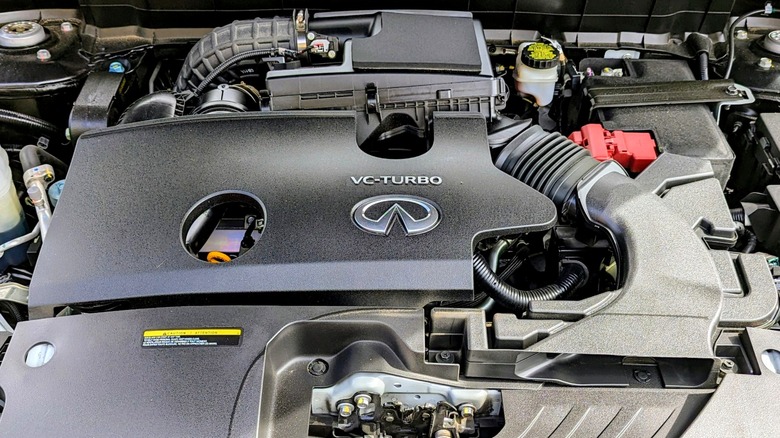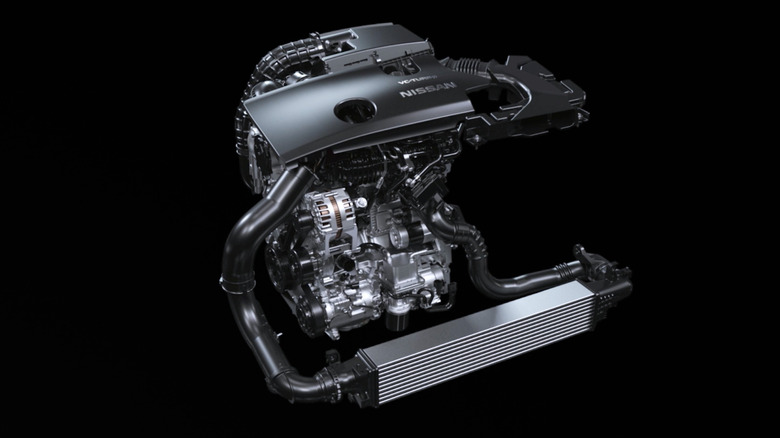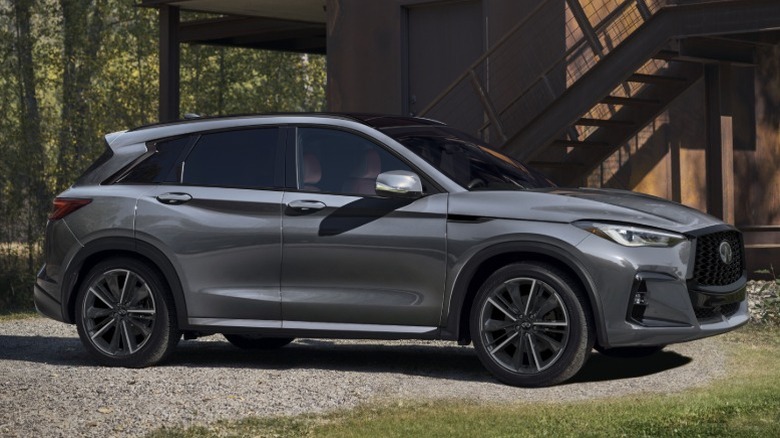Is Nissan's VC-Turbo Engine Reliable? Here's What Drivers Say
The downsizing of engines by carmakers is a strategy that's now all too familiar. Over the past decades, many automakers have had to shrink their engine sizes as part of efforts to comply with government-imposed emissions rules. These smaller engines are then typically equipped with technologies such as turbochargers, direct fuel injection, and variable camshaft timing systems as a means to achieve the perfect mix of performance and fuel efficiency.
Of course, different manufacturers adapted differently, and in the case of the VC-Turbo engine, which was first introduced in the 2019 Infiniti QX50, Nissan included a variable compression ratio system alongside a turbo. Like the name suggests, Nissan's VC-Turbo technology adjusts the compression ratio while the engine is running. Depending on load and driving conditions, the compression ratio can increase up to 14:1 to boost fuel economy in low load situations, or drop to 8:1 to improve performance in high load situations.
However, the story of Nissan's VC-Turbo engine is not just a tale of high efficiency and improved performance. It has had a lot of bad press, and Nissan has had to recall the engine due to a potential failure risk. So, ultimately, for anyone who's in the market for a Nissan, the question becomes: Is Nissan's VC-Turbo engine reliable enough for long-term use? Owner reports indicate that the engine may be prone to premature failure, although it's far from a foregone conclusion. Here's what they are saying.
Reliability is a mixed bag
Based on owner reports online, the Nissan VC-Turbo engine reliability varies. While dozens of posters say they haven't experienced any problems at all, others stated that they've had some engine-related problems, most notably stalling and engine failure. One owner of a VC-Turbo-powered 2023 Nissan SUV claimed that their vehicle suddenly stopped accelerating and was eventually told that they needed a new engine. It would appear that the engines fail way too soon as well, as some owners of affected vehicles have had engine failure within the first 10,000 miles.
The various failure reports have been linked to premature bearing failure. Some VC-Turbo engines have long been known to suffer from main bearing as well as A-, C-, and L-links issues. Nissan seemingly confirmed the issue in July 2025 when it initiated a major recall affecting more than 400,000 vehicles due to bearing faults, which could potentially cause the engine to fail. Main bearing problems aside, some Nissan VC-Turbo engines reportedly suffer from head gasket issues, with owners noting they've had to replace their engines due to failed head gaskets. Despite these problems, the fact that many say they've had no issue with the Nissan VC-Turbo engine means your mileage may vary here.
Which vehicles have Nissan's VC-Turbo engine under the hood?
Nissan's VC-Turbo tech is available in two engines: a 1.5-liter inline-3 and a 2.0-liter inline-4. The smaller 1.5-liter engine debuted in the 2021 Nissan Rogue, and, as of this writing, is the sole engine offered in the compact SUV, where it makes 201 hp while averaging 33 mpg at best. Unfortunately, Rogues were the most recalled in Nissan's July recall, with a total of 348,554 units affected. You may have to proceed with caution if you're set on buying a 2021-2024 Nissan Rogue. As for newer Rogue models, some have claimed that Nissan has made the necessary adjustments to address the issues with the lower links and main bearings, although there is no official word from the company.
The 2.0-liter VC-Turbo inline-4 engine, meanwhile, features in the Nissan Altima (2019-2024 model years), Murano, the stylish and streamlined Infiniti QX55, QX60, and QX50, with output ranging from 241 to 268 hp. Infiniti will be retiring the QX50 and QX55 after 2025, leaving the QX60 the only VC-Turbo Infiniti option for buyers. That may not be a big loss, however, as we didn't find the Infiniti QX55 all that great to drive when we reviewed it. Infiniti priced the final edition of the QX50 from $44,350, while the 2025 Infiniti QX55 starts from $51,500 (both including a $1,350 destination charge). All VC-Turbo Infiniti models have a 268-hp version of the engine, with fuel economy ranging between 24 and 26 mpg depending on the model.


